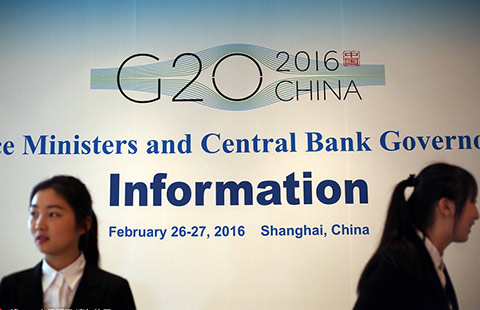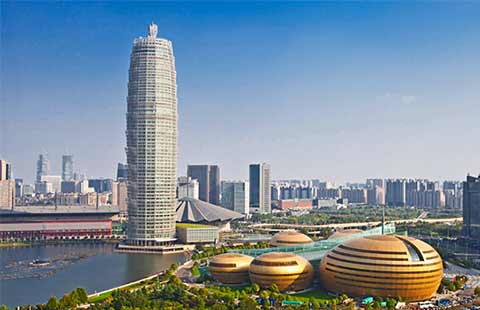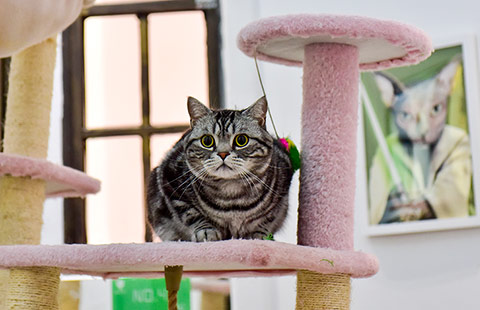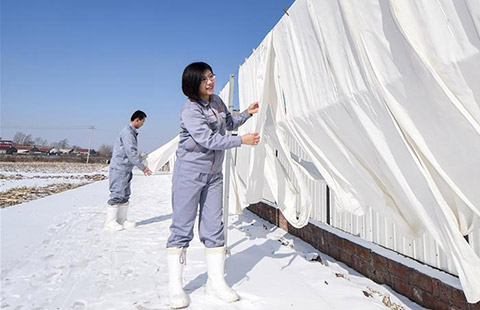Olympic ideal helps companies go global
(chinadaily.com.cn) Updated: 2012-09-12 16:39Host: Hello everyone, welcome to Biz Talk, I'm Cai Muyuan with chinadaily.com.cn. Today we are honored to have in our studio Feng Jun, chairman and chief executive of Aigo Digital Technologies Co Ltd. Welcome, Mr Feng.
Feng Jun: Just chairman please, as I'm no longer the chief executive of Aigo.
Host: Ok, sure. Here comes the first question. As we know, together with about 20 Chinese entrepreneurs, you established Aigo Entrepreneurs Alliances last year. How is it doing now? And I heard that you guys did some field research on the overseas market. What did you find out? Any ideas about how to tap into the global market?
Feng: The Aigo Entrepreneurs Alliances is an organization to help Chinese brands go global. There is nothing new about overseas research because we have done this a lot of times. What does count is some of us have established offices abroad. We began with Belgium, Britain, and Denmark, three amicable European countries. They welcome us a lot. So we will help Chinese enterprises get a foothold there step by step.
From Sept 13 to 20, a delegation of Chinese entrepreneurs will visit Thailand, Indonesia, Singapore, and Malaysia, four ASEAN member countries, also very amicable. We will vote, after inspecting the local market, for two countries most suitable for setting up offices. The other two countries will therefore be scratched out. But they are actually winners. They stood out from all ten ASEAN member countries in the first place. They won already.
Host: I'm interested in how the organization, as the facilitator for Chinese enterprises to expand overseas, is received by the governments and people there.
Feng: They like us there because we are friendly. They like to deal with friendly people from China. In the past, Chinese went there mostly as tourists, shopping only, but rarely as entrepreneurs, except for some private business owners who landed there illegally. Those businesses couldn't represent Chinese brands. Most Chinese brands have yet to go global. Now we get to unite these great domestic brands to expand overseas. It is beneficial for those countries because we create jobs and pay taxes. It is in their stakes to welcome Chinese enterprises.
The way we do it has been learned from the Olympic Games. We help Chinese brands to tap into the global market together, with "zero tolerance" for anything illegal, just like the Olympic Games do not tolerate illegal behavior like doping or any other things harmful to human beings. We do that too. We will not tolerate anything against laws or ethics so that we are able to improve the global image of Chinese brands and win more supporters and friends out there. With this support, and with our diligence and intelligence, we can create more values for the world.
Not only can we generate revenue for those countries, but we provide more great products and services for their neighboring countries. In this way, we can bring real profits for those countries.
Host: Speaking of "zero tolerance", how many enterprises have offered to join the organization so far and by what standards do you pick them?
Feng: So far the organization has absorbed nearly 100 enterprises, including Gree Electric Appliances Inc and Huiyuan Juice Group Ltd, from various industries. Many enterprises which offered to join us are front runners in their industries. But our rule is to select at most one enterprise from each industry. There are more than 3,000 industries out there. We have to give up many enterprises. We are only capable of helping 500 Chinese enterprises, from different industries of course, go global together.
Another reason is to avoid conflicts because the biggest enemy for China is not from the outside but from inside. For instance, the minute the London Games ended, Chinese e-tailers plunged into a price war. They were almost at each other's throat. Such a phenomenon is age-old in China. But our overseas partners are not any happier about this. Well, some may be cheering. But for those visionary partners and friends, they don't really want to see conflicts within Chinese enterprises because the constant internal fighting will undermine services to the very end. It will even breed counterfeit products.
So what we need is a virtuous environment. We have to learn from the International Olympic Committee (IOC), which acknowledges only one champion in each field, and select at most one sponsor from each industry. The way it performs can make sure that the Olympic Games is harmonious enough for everyone to create values instead of fighting with each other.
Host: You're right. I feel the same way. I believe many Chinese people always wonder why we see "Made in China" quite often in foreign countries, but rarely Chinese brands. This begs the question: what makes it so hard for Chinese enterprises to go global? The organization provides a good platform for our private enterprises. Will it fare well in the future?
Feng: There are two reasons, I think. First, it's only been 30 years since China's reform and opening-up. Chinese enterprises have to lay a solid foundation first within China. That's why most of them have been busy vying for the domestic market shares.
But internationalization is inevitable now, whether you like it or not. A big challenge for Chinese enterprises lies in that it's very risky to go global alone. And the cost is very high. Once it succeeds, troubles follow. Many domestic firms start stealing its talents and clients, thus undermining its domestic market. Going global alone is a risk too high to take. But the truth is, it's a dog-eat-dog world out there. If you don't come to them, they'll come to you. By then there will be nowhere to hide. Therefore, we have to stick together when going global.
Actually, there is a great teacher (IOC) within our reach. The Beijing Olympic Games we held four years ago was a huge success. Then why don't we think about how the IOC mobilized us in doing this? We worked so hard to make this happen, because the IOC has a unique business mode to push us forward. Why don't we just learn from the IOC? Everybody considers learning from the Olympic Games a cliché. But it is not athletes we are talking about here. It is the way the IOC organizes that we have to learn from. We Chinese need this. Fighting alone is very risky. We need to stick together, help each other, and refrain from internal conflicts. That's why we plan to select at most one enterprise from each industry.
- Huawei grows consumer products range across Western Europe
- Xiaomi introduces video call app with US firm
- Asian woes take toll on AIA Group
- Regulator quashes registration-based IPO rumors
- Foxconn casts doubt on Sharp deal
- Products presented at MWC in Barcelona
- Industrial diversity pays benefits for local economy
- 'Invented-in-China’ products to the fore at MWC
















